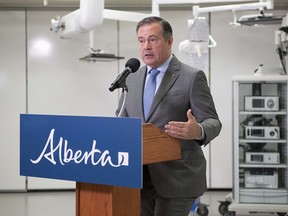The premier, remarkably, accused the AHS executive of regularly misinforming his COVID cabinet committee about crucial surge capacity
Author of the article:Don Braid • Calgary Herald
Publishing date:Sep 07, 2022 •

Former Alberta Health Services CEO Verna Yiu
and Premier Jason Kenney. Postmedia file photos
The UCP is turning its sights on Alberta Health Services.
The UCP is turning its sights on Alberta Health Services.
Leadership candidate Danielle Smith wants to fire the whole appointed board.
Premier Jason Kenney, remarkably, accused the AHS executive Wednesday of regularly misinforming his COVID cabinet committee about crucial surge capacity before and during the height of the pandemic. In April, CEO Verna Yiu was dismissed with a year still left on her contract.
Premier Jason Kenney, remarkably, accused the AHS executive Wednesday of regularly misinforming his COVID cabinet committee about crucial surge capacity before and during the height of the pandemic. In April, CEO Verna Yiu was dismissed with a year still left on her contract.
The crisis blew up almost exactly one year ago, when the Delta wave of COVID was surging after the government had declared the pandemic over and launched the Open for Summer campaign.
Kenney and his cabinet committee faced a dire choice. They could impose extremely severe restrictions, thereby infuriating large parts of their rural base and admitting that Open for Summer was a disastrous mistake. Or they could seek a middle ground by also ramping up ICU capacity.
The internal debates over this were emotional. Bitterness and tension grew between AHS and the government. Chief Medical Officer of Health Dr. Deena Hinshaw was caught in the middle as the official who had endorsed Open for Summer and then faced AHS demands to bring in severe restrictions.

On Wednesday, as he announced more publicly funded surgical capacity in private clinics, Kenney essentially scapegoated AHS as the source of the problem with ICU capacity.
Premier Jason Kenney announces more publicly funded surgical capacity in private clinics on Wednesday. Chris Schwarz/Government of Alberta
“We did not have adequate information because at the beginning of the pandemic in March of 2020, we were told that surge capacity maximum, surgical capacity for intensive care, could be up to 1,060 hospital beds.
“That number went down to 470 in November of 2020 . . . and we were informed exactly a year ago, a year ago this week, as we were approaching the height of the Delta wave, that maximum surge capacity was, I think, 230 ICU beds — so, one quarter.”
The “September surprise,” he said, was that “the best the system could do was stretch from 173 to 230.
“There were complex reasons for that, but it was in my view unacceptable to have decision-makers surprised by that radical reduction in surge capacity at the last minute, in a critical moment.
“I don’t think that would be acceptable in any institution. And so we had to look at every possible means to increasing that surge capacity — eventually we established a total of 380, capped out at about 335.
“All politics aside, decision-makers need clear and timely information when dealing with a crisis like this. And we simply did not receive that.”
But was the AHS information wrong at a given moment? Any estimate of ICU capacity over 1,000 would surely have come with a caution that to achieve it, virtually all elective procedures would have to be postponed provincewide, and a good many urgent ones as well.
Early in the pandemic, when systems in countries such as Italy were overwhelmed and virtually paralyzed, health officials made calculations based on the worst possible scenarios. Canadian health authorities — including Alberta’s — came up with capacity estimates based on what would have to be sacrificed to ramp up ICU levels.
It seems likely, then, that the varying ICU counts supplied by AHS considered different factors in each case. Kenney acknowledged Wednesday that such factors were understood.
Whatever one thinks of AHS, it’s highly unlikely they could miscount surge capacity in their own hospitals by a factor of four. If Kenney’s committee members simply didn’t grasp the complexity, that’s on them, not AHS.
The outgoing premier may be engaging in some legacy-shaping here. But, mercifully, he is not falling for all the calls from some leadership candidates to reorganize the whole system.
That’s been tried several times since the 1990s and the problems persist, Kenney said. The government should focus on “actual outcomes, as opposed to replaying the endless cycles of structural changes.”
Yes to that, anyway.
Don Braid’s column appears regularly in the Herald
Twitter: @DonBraid

No comments:
Post a Comment